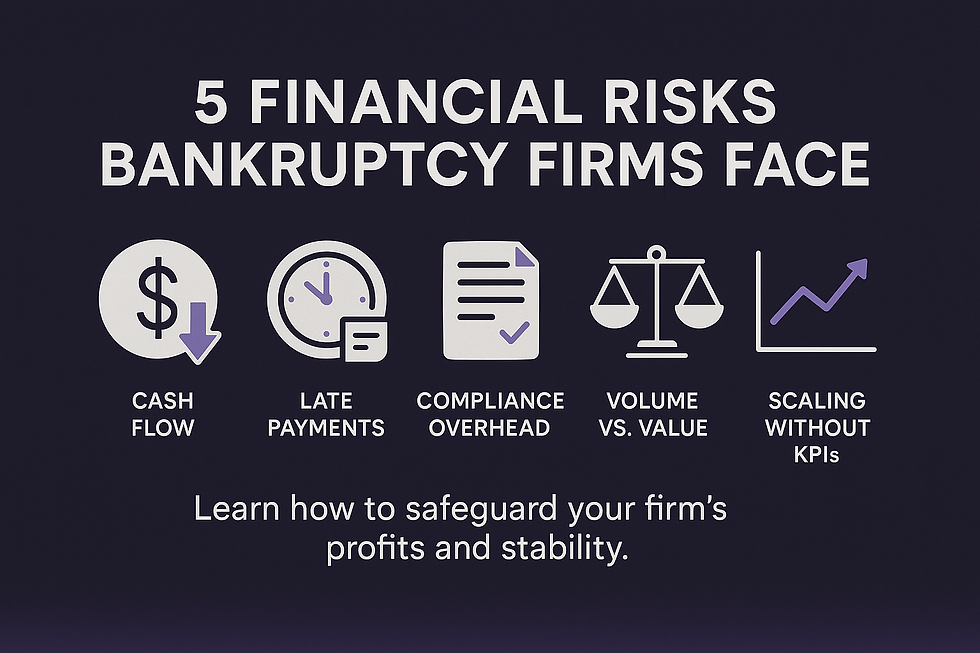The 5 Biggest Financial Risks Bankruptcy Law Firms Face (and How to Protect Profitability)
- TLTurner Group

- Nov 7, 2025
- 4 min read
Updated: Dec 5, 2025

As a bankruptcy lawyer, you spend your days guiding clients through financial collapse. But here’s the uncomfortable truth: your own firm may be one step away from the same risks.
Late client payments, compliance-heavy admin, and thin margins quietly drain profitability. And as Columbia Law research warns:
“Law firms don’t just go bankrupt, they collapse… often going from apparent health to liquidation in a matter of months or even days.” [Columbia Law Review]
Your clients’ financial instability can easily spill over into your practice if you don’t build safeguards.
Below are the five biggest risks bankruptcy firms face, along with strategies and tools to stay ahead.

Risk #1: Cash Flow Gaps Between Retainers and Payroll
Bankruptcy cases are unpredictable. A client may pay a small retainer, but cases can drag on for months while payroll and rent remain steady.
The cash flow roller coaster: one month you feel flush, the next you’re scrambling to cover costs.
🎥 Watch our video: The Cashflow Roller Coaster — Why Bankruptcy Firms Struggle with Predictable Income
How to stabilize cash flow:
Offer staged billing (collect fees in phases)
Use payment processors that enable legal fee financing
Build a 3-month buffer for overhead
Risk #2: Clients Who Don’t Pay = Profitability at Risk
Bankruptcy clients often default on payment plans, even after cases are filed.
Terrell A. Turner, CPA (Co-founder of TLTurner Group and chair of the ABA Law Firm Finance Committee) warns:
“When clients don’t pay on time, it’s not just a collections issue … it’s a profitability issue. You can show revenue on paper, but if cash isn’t coming in, your firm is funding the work out of pocket.”
Protect yourself:
Require upfront retainers where possible
Set clear billing agreements with consequences
Track receivables weekly, not quarterly

Risk #3: Compliance Overhead That Eats Margin
Bankruptcy law is compliance-heavy. Court filings, trustee reports, and documentation create mountains of admin that cut into attorney hours.
Fix the overhead drain:
Automate filings and reminders
Audit vendor/software costs twice a year
Delegate admin so attorneys stay billable

Risk #4: Volume Without Value
Consumer bankruptcies are often capped-fee cases. Chasing high volume to cover costs can burn out staff while margins remain thin.
Turner explains:
“Volume without profitability is a treadmill. You feel busy, but you’re going nowhere.”
Stronger strategies:
Diversify into business bankruptcies or financial advisory
Track profitability by case type
Streamline processes so staff can handle volume efficiently

Risk #5: Scaling Without Clear KPIs
Hiring is one of the riskiest moves. Some firms wait too long, others panic-hire. Both cost money and stability.
Track these KPIs before hiring:
Revenue per lawyer
Overhead percentage
Net profit margin

Industry Trend Spotlight: Bankruptcy Filings Are Climbing
Recent metrics show clear upward momentum:
In June 2025, 46,226 total filings were recorded — up about 15% from June 2024’s 40,293. (ABI)
ABI reports that total and consumer filings increased ~10% in the first half of 2025 versus the same period in 2024. (ABI)
AIS’s Bankruptcy Insights Report projects continued growth based on these trends. (AIS)
What these numbers mean:
Bankruptcy filings are no longer just creeping upward — they’re accelerating. For firms, this means case volume is likely to rise steadily over the next 12–18 months. That creates opportunities for revenue growth but also risks: without scalable systems, more filings can just mean more chaos.
Projected Outlook:
If filings continue at the current 10–15% growth rate, the U.S. could see ~550,000+ cases in 2025 and ~600,000+ in 2026. (These are estimates, not confirmed forecasts.)
At a conservative average attorney fee of $2,500 per case, 600,000 filings represent $1.5B in total legal fees. If more complex cases (Chapter 11, large restructurings) drive higher fees, the aggregate could push toward $2B–$3B.
🎥 Watch our video: The 2025 Bankruptcy Boom: What Every Firm Needs to Know
What this means for your firm:
Revisit your marketing strategy → monitor CAC (Client Acquisition Cost) so you’re not overspending to capture new volume
Audit staffing + workflows now, before filings surge
Lean harder into digital consults + automation to scale intake without adding unnecessary overhead

DOWNLOAD YOUR BANKRUPTCY LAW FIRM FINANCIAL CLARITY RESOURCE
Simplify your firm’s finances in 20 minutes or less.
Get the simple 3-step guide to:
Understand your key numbers.
Forecast with confidence.
Protect profitability.
Conclusion
Running a bankruptcy practice means balancing thin margins, client defaults, and compliance costs. But with the right billing structures, financial strategies, and tools, you can protect profitability while continuing to help clients reset theirs.
About TLTurner Group
TLTurner Group is a premium accounting and advisory firm that helps law firms simplify their finances, scale profitably, and make smarter business decisions. Recognized by The New York Times and led by award-winning CPA Terrell A. Turner, the firm specializes in bookkeeping, CFO advisory, and financial strategy for solo, small, and mid-sized firms.
Our mission is simple: give law firm leaders the clarity, tools, and confidence to run profitable practices without burning out.
Learn more about TLTurner Group









Comments